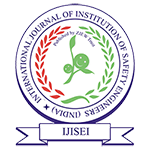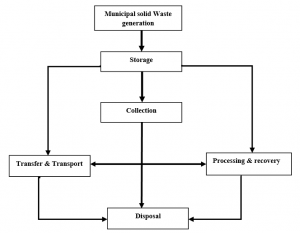Municipal Solid Waste Management (MSWM): A Review
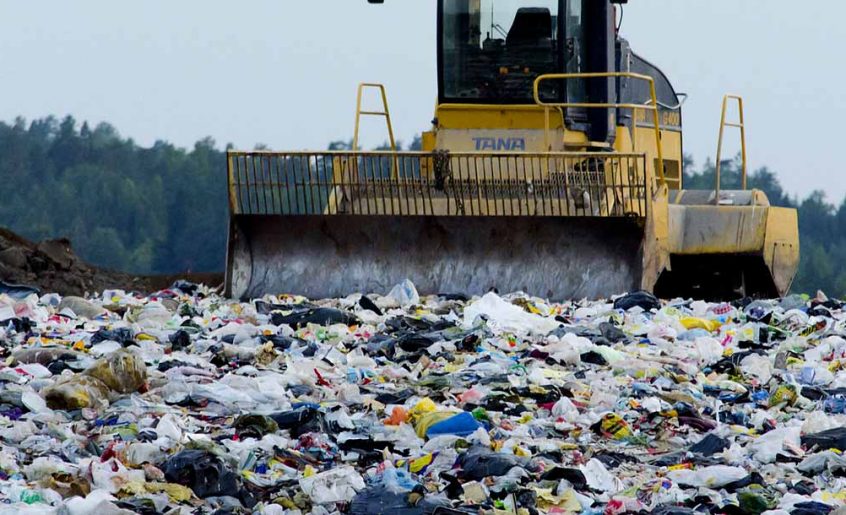
Volume 2, Issue 4 – 03, October-December 19
Municipal Solid Waste Management (MSWM): A Review
1Dr. Sindhu J. Nair, Professor BIT Durg
Email id: sindhu.jnair@yahoo.in
2Mr. S Rampuri, CEng., M.Tech, PDIS, AMIE, ADOHSEM, SMISE, NEBOSH-IGC with
15+ yrs Experience as EHS professional
Email id: shahnawaz.rampuri2@gmail.com
Abstract
In this world, developing countries are facing lot of challenges to control associated risk with municipal solid waste due to poor method of collection, transport, treatment and disposal. Municipal Solid waste creates environmental issue such as polluting to air, water, land and it results public health issue. It degrades our climate, modifies our environment as well as create hazardous situation that is harmful for living things. Some Municipal solid waste is useful when it is recyclable, re-use, or use this waste to convert energy. In this study, existing waste management system of developing country has been reviewed and recommendation has been made to control waste generation and adopting safe method to waste storage, transportation, disposal and management. So this paper is very helpful to know potential harm associated with municipal solid waste and control such effect to save environment and living thing.
Keywords: Municipal solid waste (MSW); waste management; Municipal Solid waste classification, Waste disposal method, Environment Protection
Objective:
- Identify types of municipal solid waste
- To protect to environment from degradation
- Keep environment safe and clean
- Minimize or reduce waste generation
- Ensure effective method of disposing and recycling
- Ensuring Compliance of MSW rules
- Protect to personnel health from hazardous agent of MSW
- Utilize to waste to convert waste to energy
- Introduction
In this world, Developing country is facing lot of challenges during managing municipal solid waste (MSW). Associated risk with MSW always effect to environment and it may lead to cause of environmental degradation and harm for living thing and such hazardous condition create from MSW due to poor waste management system and its ineffective implementation. Effective waste management system help to control associated risk with MSW. Municipal Solid waste (MSW) includes household waste, wastes from hotels and restaurants, construction and demolition debris, sanitation residue, and waste from streets that is under municipality. In India Approx. 67 million tons of MSW generated per year and it increase approx. 5 % every year. In India, It is estimated that solid waste generated in small cities and Town is 0.1 kg, medium cities and Town is 0.35 kg and large cities and towns is o.5 kg per capita per day respectively and annual increasing waste generation 1.33%. In United States (US), 2015, about 262 million tons of MSW generated in which 52.5% land filled, 25.8% recycled, 12.8% burned with energy recovery and 8.9% composted. Developed country have enough resources and technology to manage waste safely, so they use resources; adopt standard practices and effective method during transportation, storage, handling, processing and disposal to MSW. In developed country, more percentage of MSW re-use to recycle or use to convert energy or in other form. Therefore, Potential risk of harm associated with MSW in developing country is more respect to developed country.
Municipal solid waste creates problems due to Poor storage, collection and disposal method, non-availability or less availability of resource to recovery including technology. Effective design and operation of municipal sanitary landfills, enforcement of respective government rules related to municipal solid waste management help to control waste related risk and prevent to environmental from degradation. Majority of municipal solid waste is food waste and residential waste. In-effective enforcement of MSW related law and poor awareness people always lead to increase associated risk with MSW.
- Municipal solid waste Generation in India
In India, urban area approx. annually 62 million tones averages waste generated out to 450 grams of waste per person per day in which municipal solid waste generation per person is 170 gram for small town and 620 gram for large city. CPCB-NEERI conducted study during 2004-05 in Delhi, Mumbai and Chennai and found waste producing these cities is 5,922 TPD, 5,320 TPD and 3,036 TPD respectively. In 2011, CPCB accessed and found Delhi, Mumbai, Chennai, Hyderabad & Kolkata is biggest waste generated cities. Waste generated in 2011 in Delhi 6,800 TPD, Mumbai 6,500 TPD, Chennai 4,500 TPD, Hyderabad: 4,200 TPD, and Kolkata: 3,670 TPD.
As per CPCB report, municipal solid waste generation in year 2010-11 is about 1,27,486 Tons per day. The same was about 1,00,000 TPD (Tons Per day) in year 2000 as per report (May, 2000) of During 2004-05, CPCB conducted survey through NEERI in 59 cities and estimated 39,031 TPD MSW generation.
Table I: Statistics of Municipal (MSW) generated in different State of India India
| States
|
MSW
(TPD) 2000
|
MSW(TPD) (2009–2011)
|
Collected
(TPD) (2009–2011)
|
Treated
(TPD) (2009–2011)
|
Growth (%)
|
| Andhra
Pradesh |
4376 | 11500 | 10655 | 3656 | 163 |
| Assam | 285 | 1146 | 807 | 73 | 302 |
| Delhi | 4000 | 7384 | 6796 | 1927 | 85 |
| Gujarat | NA | 7379 | 6744 | 873 | – |
| Karnataka | 3278 | 6500 | 2100 | 2100 | 98 |
| Kerala | 1298 | 8338 | 1739 | 4 | 542 |
| Madhya Pradesh | 2684 | 4500 | 2700 | 975 | 68 |
| Maharashtra | 9099 | 19204 | 19204 | 2080 | 111 |
| Manipur | 40 | 113 | 93 | 3 | 182 |
| Meghalaya | 35 | 285 | 238 | 100 | 713 |
| Orissa | 655 | 2239 | 1837 | 33 | 242 |
| Punjab | 1266 | 2794 | NA | Nil | 121 |
| Rajasthan | 1966 | 5037 | NA | Nil | 156 |
| Tamil Nadu | 5403 | 12504 | 11626 | 603 | 131 |
| Uttar Pradesh | 5960 | 11585 | 10563 | Nil | 94 |
| West Bengal | 4621 | 12557 | 5054 | 607 | 172 |
Source: CPCB (2000b, 2013)
Table II: Total MSW generated, collected and MSW per capita generation
| Description | Data | Year |
| Total MSW generation ( MTPD) | 0.141064 | 2014 |
| MSW generation per capital | 200 – 600 | 2016 |
| Waste Collected | 0.1,27,531 | 2014 |
| Waste processed | 0.034,752 | 2014 |
Sources: CPCB, India
Note: MTPD means million Ton Per day
- Composition & Nature of waste
The composition and nature of municipal solid waste varies municipality to municipality. Majority of composition of Municipal solid waste include, Organic waste and it is also known as biodegradable waste, second is Non-organic waste and third is recyclable waste.
In simple language, it can be categories in Hazardous waste and nonhazardous waste. Non-hazardous is very dangerous to environment as well human. Paint, hazardous chemicals, pesticides, electrical & electronic appliances are example of Hazardous waste. Food waste, green waste, paper are few example of non- hazardous waste. MSW Waste generate from residential, commercial, institution and industrial area. Classification of Solid waste is hereunder
Table III: Solid waste Classification
| Waste Classification | Example |
| Biodegradable waste | Food and kitchen waste, green waste, paper etc. |
| Recyclable materials | paper, cardboard, glass, bottles, jars, tin cans, aluminium cans, metals, certain plastics, fabrics, clothes, tires, batteries, etc. |
| Biomedical waste | Expired pharmaceutical drugs such waste that generated from diagnosis, prevention or treatment or research of disease in hospital, clinic, medical research laboratory etc. |
| Electronic (E) waste | Electrical and electronic appliances, light bulbs, washing machines, TVs, computers, screens, mobile phones, alarm clocks, watches, etc. |
| Hazardous waste | Paints, chemicals, tires, batteries, fertilizers etc. |
In 2007, A study of Indian metro cities where population over 1 million estimates MSW composition (by weight) to be 41% organic or biodegradable, 40% inert, 6% paper, 4% plastic, 4% textiles, 2% glass, 2% metals and 1% leather. In 2014, according to India Planning Commission MSW study, 51% of MSW is organic or biodegradable, 32% is inert or non-organic and 17% is recyclable waste.
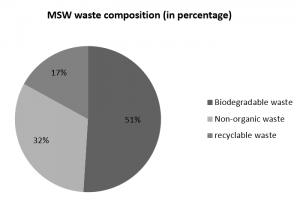
India Planning Commission MSW study, 2014
- Challenges:
To controlling risk related to municipal solid waste is challenging job for every country. Indian Government have made certain rule and regulation such as Municipal Solid waste rules to using, transferring and disposing MSW in safe manner. Municipal Solid Wastes (Management and Handling) Rules, 2000 replaced as solid waste rules in 2016by Indian government. Due to ineffective enforcement of MSW rules and poor awareness among society people is main challenge to reduce waste generation and its safe disposal. Apart from this, resource is also major factor and due to non-availability of resources including technology and Transport facility, MSW can’t be dispose or transfer or recycle safely or combustible solid waste can’t be used to generate Power. Adequate numbers of waste bin not provided in municipal area is also factor to create hazardous situation. Poor supervision is also factor to control to municipal solid waste.
5. Municipal solid waste management
Effective method of collection, Storage, Transportation, Processing is main parameter of Municipal Solid waste management system (MSWMS). Basically recycling, composting, disposal, and waste-to-energy converting is main element of MSWMS. Storage means, such place, which identified to store MSW and it can be also known as designated place of MSW storage. Storage may be container or any place that is used to store to waste. Collection includes gathering of Municipal solid waste, Processing and recovery includes, Separation of waste materials as per their nature and category, use for recycle or re use or use for electrical power generation.
To collect waste materials, it Transfer through transport to such location where vehicle will be emptied. This location may be materials processing facility or a transfer station or a landfill disposal site.
Fig. I: Components of Municipal solid Waste management System
India government also lunched different program such Swachh Bharat mission to clean up nation from waste. Government have made rules to control waste generation and manage to MSW. In India, Generally Municipal Authority have allotted bin or container in different area of municipality, Generated waste from residence or other municipal area collected in allotted bin or container of MSW area, Municipal vehicles come and collect to waste and dispose or transfer on such place where is identified for dumping, or recycling or used to generate power. In India, many municipality have adequate resources for handling and managing MSW and several municipality have less resources and due to less resources, Municipal authority faces several challenges during storage, collection, Process and disposing to Municipal Solid waste in safe manner.
Effective Landfill & Energy generation from MSW is best option to control municipal waste. Landfills are created by land dumping. Effective Land dumping methods help to prevent environmental degradation and avoid land pollution. As per govt. guide lines land fill must be done because landfills can cause of pollution and can intoxicate ground water due to ineffective landfill and availability of toxic/ hazardous waste with MSW. Usually landfills are surrounded by large walls or fences hiding the mounds of debris. Large amounts of chemical odor eliminating agent are sprayed nearby surrounding area of landfills to hide the evidence of the rotting waste.
Combustible MSW can be used to generate electricity. Such waste will be used as fuel to generate heat and steam and steam will be used to operate to turbine and generate electricity. So, Waste convert into energy from Municpal soild waste is good option to generate electricity. Burning of MSW also reduce waste quantity. Several large landfills used generate electricity by using the methane gas that is produce from decomposing biomass in landfills and this can be used to generate electricity. In 2016, 71 U.S. power plants generated about 14 billion kilowatthours of electricity from burning about 30 million tons of combustible MSW.
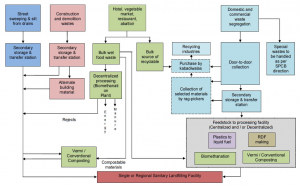
Source: Planning Commission Report (2014).
Fig. II: Integrated MSWMS for Population less than 1 Lakh
Conclusion: Municipal Solid waste has negative impacts on environment and it may cause of environmental degradation if safe and effective method not used during storage, handling and disposing. MSW can be reuse, recycle and also be use to generate energy as per their nature. MSW should be segregated, stored and dispose properly as per their nature and properties. Some MSW may be Combustible and it can be used as electricity generation. Some MSW can be reuse or use after recycle. During Landfill always take effective measure to avoid pollute to land or formation of hazardous environment nearby by damp area. Large dump area can also use to electricity generation from formed methane Gas. Few MSW can be used as compost due to their property and convert waste into compost to use suitable method of compost making. MSW such as greenery vegetable waste, food waste, ash can be landfill and latter it can be use as compost. Awareness among municipality people is very essential to reduce waste generation and handle properly. Government should frame and strictly enforced the Law related to MSW.
Adequate numbers of bin or container must be provide in municipality area and dispose time to time by municipal authority. Adequate measure will help to control MSW generation and their associated risk.
References:
- Rahman,Md. Atiqur., Hassan, Dr. Khondoker, Mahbub., “Scenario of Market Waste Managementand Environmental Degradation: A Case Study in Khulna City Area,” Proceedings of the Waste Safe 2013 -3,d International Conference on Solid Waste management in the Developing Countries 10-12 February 2013, KhuIna, Bangladesh.
- Kaushal, R. K., Varghese, G. K., & Chabukdhara, M. (2012). Municipal solid waste management in India-current state and future challenges: A review. International Journal of Engineering Science and Technology, 4, 1473–1489.
- A. Taiwo., “Waste management towards sustainable development in Nigeria. A case study of Lagos state,” International NGO Journal Vol. 4 (4), pp. 173-179, April 2009
- Alamin., Hassan, Dr. Khondoker, Mahbub., “Life Cycle Assessment of Solid Wastes in A University Campus in Bangladesh,” Proceedings of the W aste Safe 2013 -3,d International Conference on Solid Waste M management in the Developing Countries 10-12 February 2013, KhuIna, Bangladesh.
- Singhal, S., & Pandey, S. (2000). Solid waste management in India: Status and future directions. TERI Information Monitor on Environmental Sciences, 6, 1–4.
- Tammemagi, H. (1999). The waste crisis: landfills, incinerators, and the search for a sustainable future. Oxford university press. ISBN: 0-19-512898-2.
- Zurbrugg, C., “Urban solid waste management in low-income countries of Asia-how to cope with the garbage crisis,” Sandec publications. 2003.
- Fiorucci, P., Minciardi, R., Robba, M., Sacile, R.,“solid waste management in urban areas development and application of adecision support system,” Resources Conservation and Recycling37,301-328. 2003.
- CPCB, 2000. Status of Municipal Solid waste Generation, Collection, Treatment and Disposal in Class I Cities, Series: ADSORBS/31/1999–2000.
- Lohri, Christian., Camenzind, Ephraim., Zurbrügg, Christian., “financial sustainability of the solid waste management system in bahir dar, ethiopia,” Proceedings of the Waste Safe 2013 -3,d International Conference on Solid Waste M. anagement in the Developing Countries 10-12 February 2013, K huIna, Bangladesh.
- NEERI, CPCB, IPC, Planning Commission Report. (2014).
